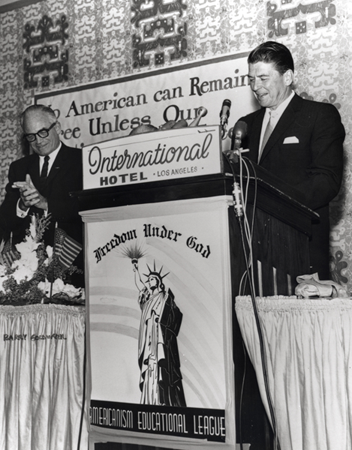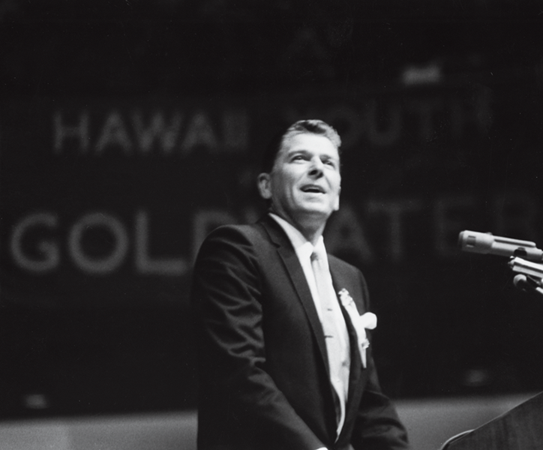
Ronald Reagan giving a speech for the Goldwater campaign at the International Hotel in Los Angeles, 1964.
The Ronald Reagan Presidential Library
One politician who was anxious to have Ronald Reagan’s help was the Republican candidate for president in 1964, Barry Goldwater, whom Reagan knew personally and liked. Reagan was named cochairman of the Goldwater campaign in California, and he traveled throughout the state raising funds for the campaign and making speeches to rally the supporters. One speech in particular would lead Ronald Reagan down a path that would change history.
It was late summer when Reagan addressed a large gathering of Republicans at the Coconut Grove nightclub in the Ambassador Hotel in Los Angeles. As he had done hundreds of times before, Reagan spoke of the perils of big, expanding government, the inefficiency of bureaucracy, and the tendency of the Democratic Party to favor expensive social programs. He cited examples of how the government routinely wasted taxpayers’ money. He urged the audience to do everything possible to help Barry Goldwater win the presidency. The audience loved the speech . . . and Ronald Reagan.
As Reagan was leaving the room, a small group of people asked if he would join them for a few minutes at their table. Other than waiters and busboys clearing tables, they were the only people in the room. Someone asked Reagan if he would be willing to make the speech again on national television if they bought the airtime. Reagan did not know it at the time, but this group of supporters included some of the largest donors to the California Republican Party.
Reagan answered that if they really thought it would help the Goldwater campaign, he would be willing to do it, and he suggested it would be better delivered to a live audience of invited Republicans rather than recorded in an empty studio. They agreed. A few days later, they reported that they had enough money to buy airtime on NBC. Reagan taped the speech in a studio with an enthusiastic audience and left expecting it would be aired as planned.
A few days later, Barry Goldwater called to say he was not sure broadcasting the speech was a good idea. Apparently, some of his advisers were worried that Reagan’s comments about problems with the Social Security system would scare away many older voters, undoing all of the work Goldwater and his staff had done to assure them that he did not want to eliminate Social Security. The advisers wanted to show a tape of Goldwater’s meeting with former President Dwight D. Eisenhower instead.
What Reagan had said about Social Security was that he strongly supported it, but that the system needed to be fixed so that it would have the solid financial foundation it needed in order to be able to provide future benefits.
Reagan told Goldwater that he had been saying the same thing for weeks, and his comments had been very well received, but regardless, the decision on whether or not to air the speech was up to the group that had purchased the airtime. Goldwater told Reagan he had not actually heard the speech and that he would listen to a tape of it before making any decisions. Reagan thought that was fair. True to his word, Goldwater listened to the tape and called Reagan back to say he found nothing troubling about what had been said, and that it was okay to broadcast the speech as planned.

Ronald Reagan at an event supporting Goldwater’s run for the presidency, 1964.
The Reagan family
By this time, however, Reagan was having second thoughts. Maybe Goldwater’s advisers were right and it was safer to show the film of Ike. Reagan thought about calling the group of donors and asking them to cancel the broadcast of his speech, but after a good night’s sleep, he decided to proceed as planned.
His decision turned out to be the right course of action. A few hours after the broadcast, a Goldwater aide called Reagan to tell him the campaign headquarters switchboard had been flooded with calls from people wanting to help the campaign. Barry Goldwater was the man of the moment, but a new political star was born.